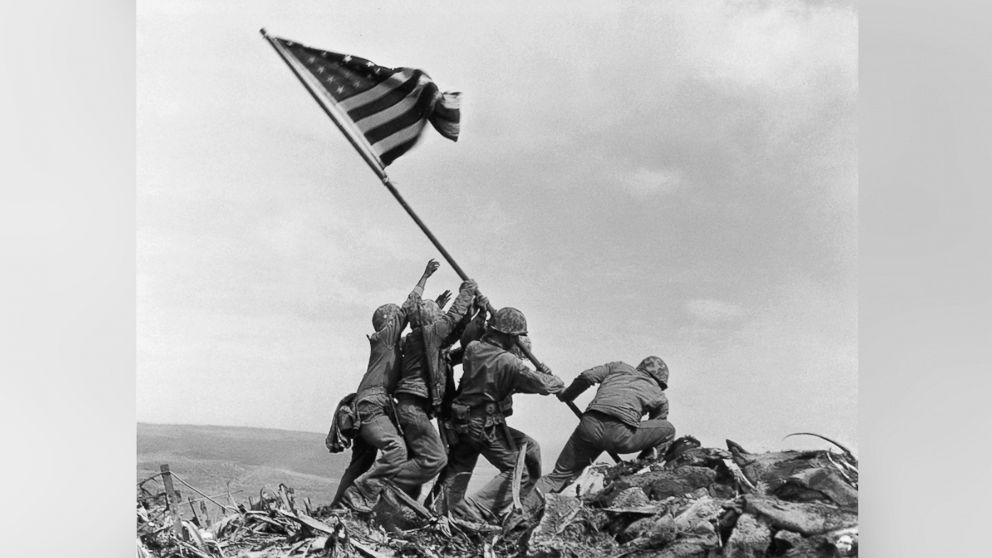Marines Investigate Possible Misidentification in Iconic Iwo Jima Photo
Photo analysis suggests Navy Corpsman John Bradley was misidentified.

— -- The Marine Corps is reviewing whether one of the six men photographed raising the flag on Iwo Jima in one of the most iconic photos of World War II was misidentified in 1945. The review was prompted by the work of two amateur historians who have reviewed other photographs taken the day of the flag raising that suggest Navy Corpsman John Bradley was not one of the six men photographed raising the flag on Mount Suribachi.
"The Marine Corps is examining information provided by a private organization related Joe Rosenthal's Associated Press photograph of the second flag raising on Iwo Jima," the Marine Corps said in a statement.
"Rosenthal's photo captured a single moment in the 36-day battle during which more than 6,500 US servicemen made the ultimate sacrifice for our Nation and it is representative of the more than 70,000 US Marines, Sailors, Soldiers and Coast Guardsmen that took part in the battle," said the statement. "We are humbled by the service and sacrifice of all who fought on Iwo Jima."
The Omaha World-Herald was first to report that the Marines had launched a review of the evidence collected by Eric Krelle of Omaha, Nebraska, and Stephen Foley, of Wexford, Ireland. Their work was profiled by the newspaper in 2014.
The famous photo taken on Feb. 23, 1945, captured the second raising of a flag on Mount Suribachi, supposedly to replace a smaller flag raised earlier that day with a larger one.
Associated Press photographer Joe Rosenthal's photograph quickly became popular and has since become a symbol of the Marine Corps, a large sculpture of the flag raising near Arlington Cemetery in Arlington overlooks the nation's capital and is a popular tourist destination.
After taking the photo, Rosenthal did not track down the names of the six men who raised the flag. That was left to the Marine Corps, who were pressed to identify them after the photo gained in popularity and was used as part of a major war bond drive.
The Marines identified the six men as Marine Privates Harlon Block, Rene Gagnon, Ira Hayes, Franklin Sousley, Michael Strank and Navy Corpsman John Bradley. Block, Sousley and Strank were killed in the fighting that carried on for another month on Iwo Jima after the photo was taken.
In its 2014 story, the Omaha World-Herald said that during an extended recovery from hernia surgery, Stephen Foley began reading books about the Battle of Iwo Jima. His attention soon focused on the photo of the flag raising that was on the cover of one of the books. He noted discrepancies in the clothing associated with the figure identified as Bradley when he began seeing other photos of Bradley that day that had been posted on the internet.
Among other things, he noted that the man identified as Bradley, the second man from the left seen erecting the flagpole, was wearing uncuffed pants that hung down over his boots and wore what appeared to be a soft utility cap under his helmet.
Other photos taken the same day as the flag raising show Bradley's pants were cuffed above his shoes and does not show a soft cap under his helmet.
Foley later sought the help of Krelle, who runs a website about the history of the 5th Marine Division, which fought at Iwo Jima.
Based on a review of other photos taken at Mount Suribachi, the two men said they are confident that the man identified as Bradley was another Marine private, Harold Henry Schultz, who died in 1995.
The lives of the six men identified as the flag raisers was the focus of the best-selling book "Flags Of Our Fathers" written by Bradley's son, James Bradley, in 2000. The book was later adapted into a movie directed by Clint Eastwood.
Contacted by the Associated Press, Bradley said he was shocked to hear of the Marine review of the possible misidentification of his father in the photo.
"This is unbelievable," Bradley said. "I'm interested in facts and truths, so that's fine, but I don't know what's happening."




